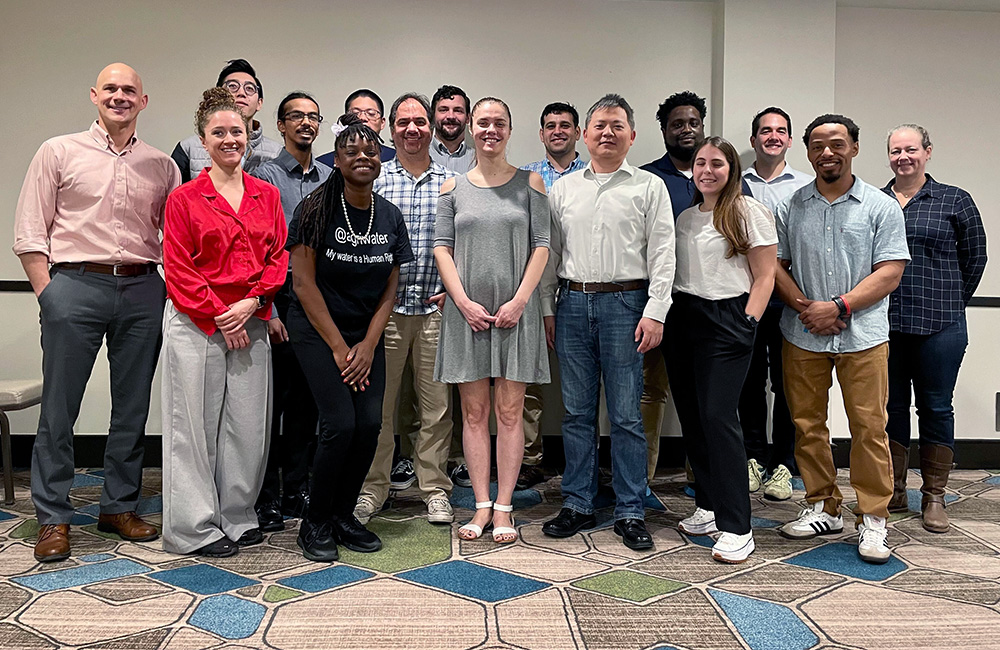In January 2023, the Interior Northeast I-Corps Hub (IN I-Corps) led an entrepreneurship course called “Ag-Corps” for STEM researchers focused on developing technology solutions that address challenges in agriculture. This unique month-long I-Corps regional course, began and ended virtually and culminated in attendance at the 2023 American Farm Bureau Federation (AFBF) Convention in San Juan, Puerto Rico.
Nine teams were selected for Ag-Corps and received travel funding from IN I-Corps to attend the AFBF Convention. The I-Corps participants engaged in entrepreneurial training on-site and conducted a minimum of 30 interviews with potential customers to discover the best product-market fit for their ag tech innovations.
“I really value the overall mode of inquiry taught through the AgCorps regional course,” said Adam Gronewold, founder of GroneWild Systems, one of the participating ag tech startups.
“As scientists and engineers, we often focus too heavily on scientific inquiry as the only mode of learning, but I found that you can often learn just as much, if not more, by interviewing people. Constructing a value proposition doesn’t need to be overly complicated. Often times potential customers will tell you exactly what they want or, at the very least, what they want you to improve.”
This was the third time the AFBF hosted Ag-Corps, which was launched by the UNY I-Corps Node in 2021 and continues today under the guidance of IN I-Corps. The AFBF provided complimentary registration to the convention as well for Ag-Corps to convene. I-Corps participants were also granted access to events such as the Ag Innovation Challenge, a national business competition that showcases U.S. ag tech startups, where they were able to conduct customer discovery and network with semi-finalists.
“Farm Bureau is proud of our continuing partnership with the National Science Foundation’s I-Corps program, which remains a key avenue through which Ag-Corps participants engage with the Farm Bureau community and our entrepreneur members competing in the 2023 Ag Innovation Challenge,” said Chase Hieneman, Director of Industry Relations at the American Farm Bureau Federation.
“These competitors have created pioneering new technology and business models to address the rising challenges faced by farmers and ranchers across the country. We are grateful that the I-Corps program continues to work with us to highlight this innovative work.”
Teams that successfully completed this year’s Ag-Corps regional course included:
- Agriwater (Bianca Bailey and Alex Heald-Alejo – University of Illinois Urbana-Champaign) is alleviating the burden of waste management by implementing onsite wastewater treatment systems for livestock farmers that utilizes electrolysis technology to remove foul odors, toxins, and GHGs from liquid manure.
- Barn Owl Technologies (Richard Chen, Jana Revallova, and Alfonso Samano) is building tech solutions to terminate agricultural pests without the use of pesticides, including a trap capable of identifying and terminating spotted lanternflies. The traps will be able to remotely provide data on pest pressure, as well as an auto-clean function to eliminate the need for in-person trap maintenance.
- Bifarm Tech (Wanjun Gao and Hanna Gru) is developing reliable, precise, and extendable, smart aeroponics grow systems for advanced growers and commercial operations to perform and to be profitable.
- Druid Agriculture (Julian Walker and Desmond Irby) is designing a simple, affordable camera system that utilizes AI-enabled software to allow farmers to remotely monitor and manage their crops via an app.
- Elixir Agritech (Behrooz Azimzadeh – Cornell University) is developing NutriBall-X, a nutrient embedded organic-based plant bedding mix specialized to plants in soil-free greenhouses and nurseries.
- GroneWild Systems (Adam Gronwold – Dartmouth College) is developing a network of offroad vehicles suited to autonomously manage in-season row crop development.
- Seneca Farms Biochar (Taryn Draxler and Rob Draxler) is developing, manufacturing, and selling cost-effective pyrolysis technology to transform biomass into biochar, pyroligneous acid (wood vinegar), and activated carbon at scale.
- VinoGut (Viral Shukla – Cornell University) is upcycling food waste streams into a poultry feed product that based on research models could lead to a more sustainable poultry industry. Previously, VinoGut explored upcycling grape pomace, food waste from the winemaking industry, into a powdered health food beverage.
- ZeroCarbon (Shiang Chin – Cornell University) is leveraging quantum computing to better estimate carbon emissions from dairy farms. Through a mathematical model it developed, ZeroCarbon can represent the processes of diffusion, aqueous-gas partitioning, and mass transport into the air to better predict how much emissions are coming from a particular farm and then recommend ways of mitigation.
The Ag-Corps regional course was taught by experienced entrepreneurs and I-Corps instructors, Steve Sauer (SC Johnson College of Business, Cornell University) and Caroline Cannon (Tuck School of Business, Dartmouth College).
The I-Corps regional course curriculum encourages participants to be customer-oriented, rather than tech-oriented. Engaging in customer discovery provides participants with valuable insights into customer needs.
“Going into the AgCorps regional course, my initial value proposition was very disorganized in the sense that I was of the mindset that our technologies would be sold to farmers on the basis of all the amazing features we offer. This made the technology difficult to communicate to others,” said Gronewold.
“The biggest takeaway from customer discovery was that I was able to distill down this value proposition into two or three key ideas, framed in the context of farmers’ needs, namely the labor problem in agriculture and the desire to decrease input costs while enhancing crop yield.”
Learn more about upcoming virtual and hybrid I-Corps regional courses.


